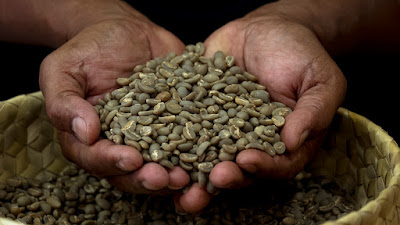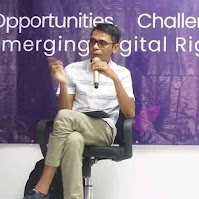Enjoy the aroma of Timor organic hybrid coffee which will be eroded by the civilization of time!
This time I crave to write about coffee. I don't know why the idea of writing coffee came to my mind. Maybe because this week, while enjoying the benefits, aroma, and unique taste of coffee, it has changed my sleeping habits in the last few days. With a cup of coffee, until midnight I still stand by accompanied by my laptop.
Indeed, in my daily activities, especially in the morning and evening, coffee is one of the characteristics that supports brain reflection for imaginative thinking, especially when there are several friends around me, of course the first thing I do is offer them a cup of coffee. Then we started small talk for several hours. It is the most common tradition in Timor-Leste, everyday families in their homes drink coffee of course, so when a visitor comes to a family's house, coffee is the first thing to offer.
In Timor-Leste the tradition of drinking coffee has existed for a long time. The specialty of coffee which is known as Arabica and Robusta hybrid or known as (Timor Hybrid) has a different taste, starting from the history of the entry of coffee in 1860 which was introduced by the Portuguese to the characteristics of Timor coffee which was introduced to the world. Although Timor coffee is known as organic Timorese hybrid cafe and globally renowned for its natural aroma, this coffee is unique for connoisseurs and coffee lovers.
Timor coffee is generally grown by the community, farmers in Gleno and Letefoho and other areas. The famous location for growing coffee is in Ermera municipality. The area has a good climate, where Coffee is grown in the highlands. Apart from the Ermera area as the largest coffee producer, there are also several other municipalities such as Ainaro, Maubisse, Aileu, Manufahi, Liquica and Bobonaro.
Even though this country has coffee as the largest export commodity with coffee providing the main income source for almost 37% of households, the coffee produced is highly dependent on exports to foreign markets by relying on organic products (coffee beans).
This short article invites us to reflect again, in the past the farmers who worked on coffee plantations, of course, had more than enough income, because the product is one of the largest export commodities, so it sells well in the local market.
To support their daily life, the community, especially the farmers in Ermera, rely on the productivity of coffee trees. That said, if someone has one hectare of coffee trees, it is not enough to be used as the main means of survival. The reason is, in recent years, in an era of worsening economic conditions, prices have continued to rise, while the price of coffee beans has remained very low, with prices for coffee cherry around $0.25 USD per kg (according to information from one of the farmers). At this price and with small volume of production, the income is insufficient to cover the basic needs.
There was one thing that was quite interesting, which surprised me when I met a fellow Timorese from the Ermera muncipality. It happened with one of my workers who worked on the foundations of my house on a hillside corner in Dili. In the morning before they started work, I offered him a cup of coffee and started to have a little chat with him. Our short chat was about coffee, how people prepare it, and I was also curious to ask about the tradition of drinking coffee in that place, because Ermera is famous for “drinking coffee without sugar”.
Then our conversation turned to the living conditions of the people in that place. I was curious to ask about the condition of coffee plantations in Ermera and how coffee can support the lives of people who depend on coffee products. He who is usually called Ajo said, in Ermera, for example a family owns 2 or 3 hectares of coffee land, some people might think that the owner must be rich, but that perception is wrong.
I was very surprised to hear Ajo's story, he said, currently the price of one hectare of coffee can be exchanged for a Samsung cell phone; while jokingly saying that the farmers have no hope, depending on their income only from coffee, because the price of coffee is very cheap even though coffee is a very important and necessary product in the social traditions of Timor-Leste.
Ajo said, many young people are the same age as him, are no longer interested in the classical tradition of gardening on coffee plantations. Currently, several coffee plantations are cultivated by parents who take care of them. Many young people come to the city of Dili and make a living instead of living in Ermera, depending on coffee income which is not very promising.
At the time of writing, next to my computer was a cup of coffee. I enjoy the cafe's Timorese hybrid aroma, the product of Timor-Leste farmers from Ermera who work hard to cultivate this organic Timorese coffee. I can imagine how their contribution is with their hard work, their extraordinary dedication to preserving Timor coffee so that it remains natural and delicious, extraordinary with its aroma.
But unfortunately, while enjoying a cup of coffee beside me, a feeling of worry and sadness about the future of organic Timor coffee appears in my mind. While imagining, will one day the next generation enjoy Timor-Leste's organic coffee like me, or will the next generation's life journey change with a different story, if coffee farmers are no longer interested in processing and preserving Timor-Leste hybrid cafes, then what is the future? Will I be drinking coffee produced in the Timor-Leste in future, or will local coffee slowly shrink and become extinct.
While enjoying your coffee, I invite friends who are reading this short article, take a few minutes to contemplate how to revive the coffee tradition, cultivating Timor coffee to exist forever. Let's enjoy coffee while thinking ahead, if one day there will be no more hybrid coffee, what will their situation (the next generation) be like in their time, living without enjoying organic Timorese coffee from the hands of local farmers just like what we are enjoying now?
Author: Celso da Fonseca
About the Author
Celso da Fonseca is a Freelance Writer, Consultant, Human Rights Activist, Lecturer and Social Service Volunteer




Comments
Post a Comment